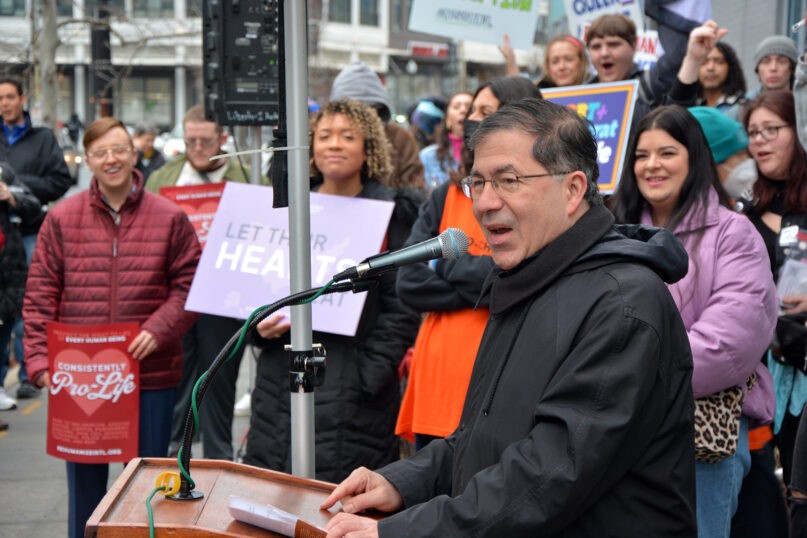After Roe, 50th March for Life a turning point for abortion protests

Frank Pavone, an anti-abortion activist who was until recently a Catholic priest, addressed a small crowd outside a Planned Parenthood clinic on the eve of this year’s March for Life, the annual demonstration against the 1973 Roe v. Wade decision, and repeated what has become a frequently posed question in the wake of Roe’s reversal in June.
“Many people in the recent months have been asking, ‘Will there still be a March for Life in Washington?'” said Pavone, who was defrocked in November for “persistent disobedience” of his bishop’s orders to stop his political activity and for what the Vatican called “blasphemous” social media posts. “And our response as a movement has been: ‘Yes, of course there will be. There needs to be. We continue marching simply because abortion continues killing.’”
The 50th anniversary March for Life on the National Mall took place on January 20, with an appearance by evangelist Franklin Graham and other prominent religious figures. But since last summer’s Dobbs v. Jackson Women’s Health Organization decision allowed states to determine their own abortion policies, much of the focus of the abortion fight has moved to statehouses across the country.
In North Carolina, where abortion is permitted through 20 weeks of pregnancy, about 1,000 anti-abortion protesters descended on Raleigh to pray and march past the governor’s house, for the state’s 25th annual March for Life.
“Because of the overturn—thank God—of Roe versus Wade, now it’s on the state level,” said Angela Harrigan, who traveled by bus with dozens of others from St. Therese Catholic Church in Mooresville, where she is a Respect Life Committee co-chair. “We want our actions to be witnessed at a state level, that we’re for life and Jesus is the author of life.”
In Michigan, where voters approved Proposal 3, a constitutional amendment preserving the state’s abortion rights, in November, anti-abortion advocates say the energy spent fighting the proposal afforded them less time to organize to attend the national march this year.
“We had amazing, really pro-life laws that, with the overturning of Roe, would go into effect,” said Kathleen Wilson, who coordinates the Archdiocese of Detroit’s Pro-Life and Project Rachel Ministries. “So we went from fighting for that and having so many great laws in place, to now being one of the most extreme permissive states with what’s in our constitution.” She described the success of Proposal 3 as “kind of a gut punch.”
Christen Pollo, executive director of Protect Life Michigan, attended the national march but is also intent on showing the governor and legislators “that we are not giving up in the wake of Proposal 3” with a significant turnout for the Roe v. Wade Memorial March at the state Capitol on January 28.
“My organization usually takes three busloads of college students and we didn’t this year,” she said of the national march. “We’re actually holding one in Michigan now to represent the fact that this battle has now returned to the state. So I’m interested in seeing what the crowd sizes will be like this weekend, given that I know many states are doing that same thing.”
Ten years ago, when she was new to her role, national March for Life President Jeanne Mancini said she expected marchers to continue their annual pilgrimage to Washington “until we work ourselves out of a job.” But days before the national gathering, Mancini said the mission is far from complete.
“The pro-life movement has just experienced a major victory in the fall of Roe v. Wade, but our work to build a culture of life is far from complete,” she said in a statement. “Those next steps include working to advance legal protections for the unborn at the state and federal level, and the continuation of the annual March for Life in Washington, DC coupled with the expansion of the State March program.”
March for Life currently lists six state marches on its website, and other statewide events are continuing or planned by other anti-abortion groups.
State anti-abortion activists said their work on the ground will continue, including their push to raise funds for pregnancy crisis centers that aid women with unexpected pregnancies and to offer support for both women and men who have been affected by decisions to have an abortion.
Faith-based supporters of abortion rights are also highlighting the need for increased activism at the local and state levels, where several faith groups have already challenged abortion bans in the courts.
“We can’t cede any moral ground in this fight,” said Sheila Katz, head of the National Council of Jewish Women, at an online event organized by the activist group Faith in Public Life. “These are our rights and we need to claim them. And like Moses, we will be back again and again and again, until everyone can make their own moral and faith-informed decisions about their body, family and future.”
Katz’s group announced this week that it has raised $1 million to help patients pay for abortion care and related travel expenses for women in areas where access to abortion is limited.
At the demonstration outside the Planned Parenthood outpost in northeast Washington they day before the March for Life, there was little sense that either side was resting, despite the chant of “Roe is dead” coming from the few dozen demonstrators.
Meanwhile, as Pavone began to speak, abortion rights activists affiliated with the group Catholics for Choice unfurled two massive banners behind him from the roof of the clinic. One read: “Most people of faith support legal abortion.”
Asked about the banners, Pavone was dismissive, insisting they were “irrelevant” before adding, “You can justify anything and slap the label ‘faith’ on it.” —Religion News Service




